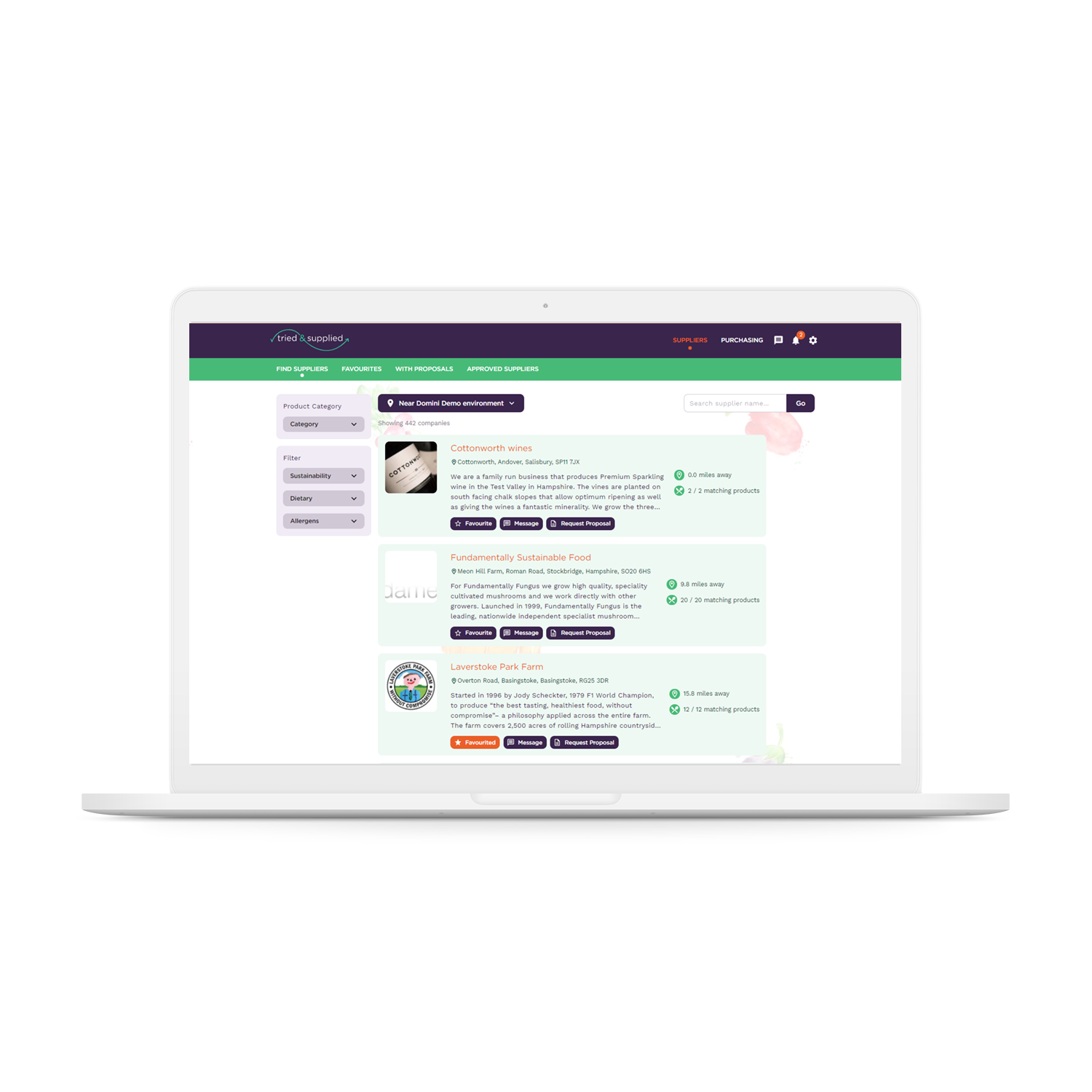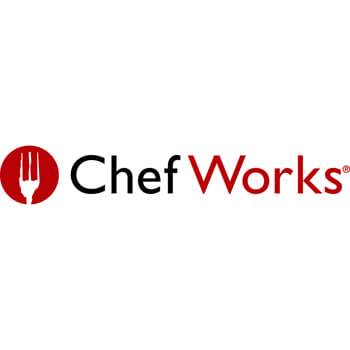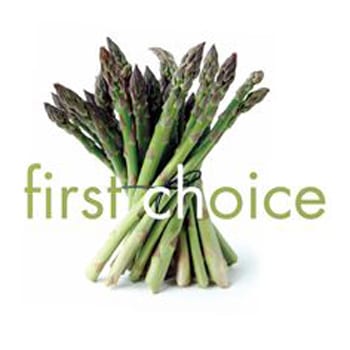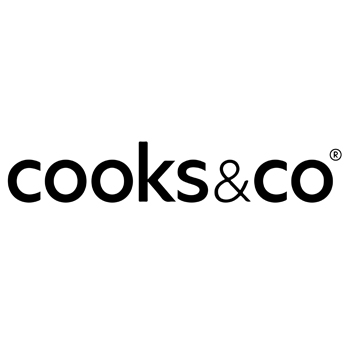A Q&A with Tried & Supplied Founder & CEO Domini Hogg – An Easy Way to Source Sustainable & Local Suppliers
 Why did you start Tried & Supplied?
Why did you start Tried & Supplied?
“I wanted to make it both easy and profitable for hospitality businesses to work with local, sustainable suppliers and support the transition to a more positive food system. That means it needs to be easy to find and purchase from local suppliers all in one place, easy to control costs and compliance, and easy to promote the sustainability of the supply chain to attract customers, employees and investors. As an entrepreneur myself I recognised the challenges for many smaller producers of finding the time to market themselves effectively so I created a marketplace where they can be found effortlessly by restaurants in their local area while also clearly displaying how they meet sustainability requirements for procurement teams. Ordering across multiple local suppliers then becomes as simple as one ingredients list, one basket total and a single click of the button.
33% of the Earth’s soils are already degraded and over 90% could become degraded by 2050 according to a recent United Nations report. We can reverse this trend while simultaneously reducing carbon emissions by switching to more regenerative farming practices, but regenerative produce is more diverse by nature and unable to sell into a global food commodity market, which means it is essential to generate demand for it locally in order to encourage farmers to switch. Tried & Supplied provides the digital infrastructure to make this possible.”
What are the benefits of local sourcing?
“When people think about local sourcing, they are often thinking about reducing food miles, but that is only really half the picture. From a chef’s perspective quality local produce means fresher, tastier, more nutritious produce. That can mean you need fewer ingredients to create the same impact on the menu. Ollie Hunter, Chef Owner at The Wheatsheaf Chilton Foliat explained at the Better Hospitality Conference “if I buy better produce, I’ve got more flavour. I do less to it. I need less ingredients to make that flavour taste good.” This has a direct impact on the bottom line while making customers happier.
But local sourcing provides a whole host of other benefits too. The closer relationships you have with suppliers means you can support each other better. They aren’t so far away if you need something urgently and you can get to know what would really help them if you bought, which is often a great way to get a good deal. Being able to tell the local stories of your suppliers also amplifies your marketing efforts and builds you a community of loyal local advocates. You can even arrange farm visits as employee perks to enable your teams to feel more engaged with the menus they are creating and serving. The closer you are to your suppliers, the more transparency, collaboration and loyalty you’ll see.”
How does Tried & Supplied make chefs’ lives easier and more rewarding?
 “Tried & Supplied enables chefs to connect more easily with suppliers and reduce the time they spend on admin during the day. It also facilitates cross team collaboration so that responsibility can be more easily shared rather than concentrated in a few individuals. Each site within a group can curate their own ingredients list from a searchable list of approved suppliers. Orders can then be drafted and added to by any member of the team during the day and approved remotely once they’re ready. If you need to check anything with suppliers, you can contact them through a shared messaging function that keeps all team members informed. By the time you reach the end of the day and want to go home, your supplier orders will be a just a few clicks of a button away. You can even send them on your way home!
“Tried & Supplied enables chefs to connect more easily with suppliers and reduce the time they spend on admin during the day. It also facilitates cross team collaboration so that responsibility can be more easily shared rather than concentrated in a few individuals. Each site within a group can curate their own ingredients list from a searchable list of approved suppliers. Orders can then be drafted and added to by any member of the team during the day and approved remotely once they’re ready. If you need to check anything with suppliers, you can contact them through a shared messaging function that keeps all team members informed. By the time you reach the end of the day and want to go home, your supplier orders will be a just a few clicks of a button away. You can even send them on your way home!
The structure of Tried & Supplied means that chefs can more easily work with the suppliers they want to work with and source the best local produce, while procurement teams and business owners still have the ability to control costs and compliance without going through a laborious paper-based process.”
 What are your top tips for optimising your supply chain?
What are your top tips for optimising your supply chain?
“Start thinking of your supply chain as a profit driver rather than a cost centre. How can you get it to work harder for you as a business? It is a core part of your product after all. Can you use your supplier stories to fuel your marketing? Can your suppliers even offer gastro-experiences to your customers? Can you find local favourites and specialist local ingredients to delight your customers? How can you better support your suppliers so that they offer you the best deals? How do you achieve the best balance between quality, value and consolidation? Is your pound going to be valued more by a smaller local producer or by a large national business? If you’re prompt at paying suppliers, they will be more motivated to support your business in return.”
 What does it look like for chefs getting started on Tried & Supplied?
What does it look like for chefs getting started on Tried & Supplied?
“All we need to know is which suppliers you’d like to work with or whether you’d like us to find new ones for you, so that we can get you set up with their products and prices. We’ll do any data entry involved so you don’t have to worry about that. This doesn’t normally take more than a couple of weeks.”
What kinds of businesses do you typically work with?
“We work with a wide range of businesses from gastropub groups that want to have regional supply chains in each area, to independent restaurants and boutique hotels that want to make purchasing simple and benefit from being part of a procurement network, even street food market operators that want to control the supply chain from a sustainability and delivery consolidation perspective.”
 How do you see the sector changing in the next decade and how is Tried & Supplied positioned to help businesses stay ahead of the curve?
How do you see the sector changing in the next decade and how is Tried & Supplied positioned to help businesses stay ahead of the curve?
“The sector is becoming heavily data orientated in a way that it never was before. This is being driven by regulations such as Natasha’s Law, calories on the menu and the Green Claims Code, as well as consumer demand for information on what they’re eating, and the uptake of technology in hospitality during the pandemic. What we don’t want is for this to detract from the enjoyment of being in the kitchen with the food creating wonderful meals. Tried & Supplied is already addressing this data challenge and providing a means of seamlessly transferring data from supplier right through to menu without the need for additional data entry en route.”












